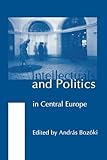Intellectuals and Politics in Central Europe / ed. by András Bozóki.
Material type: TextPublisher: Budapest ; New York : Central European University Press, [1998]Copyright date: ©1998Description: 1 online resource (306 p.)Content type:
TextPublisher: Budapest ; New York : Central European University Press, [1998]Copyright date: ©1998Description: 1 online resource (306 p.)Content type: - 9789633865705
- online - DeGruyter
| Item type | Current library | Call number | URL | Status | Notes | Barcode | |
|---|---|---|---|---|---|---|---|
 eBook
eBook
|
Biblioteca "Angelicum" Pont. Univ. S.Tommaso d'Aquino Nuvola online | online - DeGruyter (Browse shelf(Opens below)) | Online access | Not for loan (Accesso limitato) | Accesso per gli utenti autorizzati / Access for authorized users | (dgr)9789633865705 |
Frontmatter -- Contents -- List of Contributors -- Acknowledgements -- Introduction -- Part One: Exits from Communism: The Strategies of Intellectuals -- Dissenting Intellectuals and Plain Dissenters: The Cases of Poland and East Germany -- The Strategies of Intellectuals: Romania under Communist Rule in Comparative Perspective -- Romanian Political Intellectuals before and after the Revolution -- From Imagined to Actually Existing Democracy: lntellectuals in Slovenia -- Words and Death: Serbian Nationalist Intellectuals -- Part Two: Politics of Identity: Political Intellectuals in the New Democracy -- Between Tradition and Politics: Intellectuals after Communism -- The Inegalitarian Nature of Hungary's Intellectual Political Culture -- The Politics of Conviction: The Rise and Fall of Czech Intellectual- Politicians -- Green Intellectuals in Slovakia -- Part Three: The Rhetoric of Action: The Power and Poverty of Critical Intellectuals -- Intellectuals and Democracy: The Political Thinking of Intellectuals -- Reaction as Progress: Economists as Intellectuals -- Rhetoric of Action: The Language of the Regime Change in Hungary -- Index
restricted access online access with authorization star
http://purl.org/coar/access_right/c_16ec
Discussing the role of intellectuals in the political transition of the late 1980s and early 1990s and their participation in the political life of the new democracies of Central Europe, this book presents original essays from authors who discuss the eight countries in the region. In the Introduction, the editor gives a historical overview of the tradition of the political involvement of intellectuals in these countries, especially in the nineteenth century. The chapters which follow describe the typical political and social attitude of Central European intellectuals, including writers, poets, artists, and scientists. A unique feature of the book is that it deals not only with the role of intellectuals in the preparation of the peaceful revolutions in the individual countries, but also critically analyzes their role in the transition and their behavior in the emerging democracies. The most striking phenomenon, common to all the countries studied, is the disillusionment of intellectuals and their disappointment in the years following the transition, a period when the role of prophet should be replaced by that of politician for those who have chosen to stay in politics. This phenomenon has, in general, been much less subjected to systematic study than the role of intellectuals in the changes themselves.
Mode of access: Internet via World Wide Web.
In English.
Description based on online resource; title from PDF title page (publisher's Web site, viewed 28. Mrz 2023)


